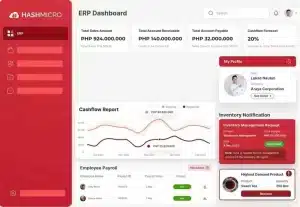Managing a supply chain requires careful coordination to ensure smooth operations. When key processes, such as inventory management and order fulfilment, are out of sync, it can lead to delays, increased costs, and customer dissatisfaction.
Pero ano ang mangyayari kapag ang mga pangunahing aspeto tulad ng antas ng imbentaryo at pagtupad ng mga order ay hindi na tugma?
Problems like overstocking, understocking, and inaccurate stock tracking are just the tip of the iceberg. These inefficiencies can lead to dead stock, delayed deliveries, and lost sales opportunities that can hurt a business’s bottom line.
In the Philippines, a report by the Department of Trade and Industry (DTI) reveals that supply chain inefficiencies contribute to an estimated 15-20% increase in operational costs for local businesses.
If you’re facing these challenges, this article will show you how Supply Chain Management (SCM) systems can help transform your operations. Keep reading to discover how SCM software can be the game-changer your business needs.
Table of Contents

Key Takeaways
|
What is Supply Chain Management?
Supply Chain Management (SCM) is the coordination of a company’s entire production flow, from sourcing raw materials to delivering finished products to customers. It seamlessly integrates supply chain logistics, operations, and processes, ensuring efficiency and customer satisfaction in every step of the journey.
A well-optimized SCM system involves sourcing materials, manufacturing goods, storing inventory, and efficiently transporting products to their destinations. Modern SCM technology enables real-time monitoring, analysis, and optimization, allowing businesses to respond quickly to market changes and minimize disruptions.
The purpose of SCM extends beyond efficiency; it fosters collaboration between internal teams and external partners to meet demand effectively. By leveraging supply chain management software, businesses can streamline workflows, reduce costs, and gain a competitive advantage in today’s dynamic marketplace.
Why is Supply Chain Management Important?
Supply Chain Management (SCM) is vital for minimizing costs, reducing waste, and shortening production cycles, directly impacting business profitability. Companies with advanced SCM capabilities often gain a competitive advantage, as studies show they can achieve up to 23% higher profitability than their peers.
Beyond profitability, an effective supply chain management system helps businesses anticipate and address potential risks, such as supply chain disruptions or regulatory challenges. By ensuring products arrive on time and in excellent condition, SCM enhances customer satisfaction, fostering loyalty and trust in the brand.
Sustainability is another critical purpose of supply chain management, especially in the face of climate change. With optimized supply chain logistics and energy-efficient practices, businesses can reduce their carbon footprint and contribute to a greener planet, balancing profitability with environmental responsibility.
The Benefits of Supply Chain Management
Supply Chain Management (SCM) is crucial for streamlining operations and optimizing processes. Without an effective SCM system, businesses often face challenges like delayed shipments, poor inventory control, and higher costs.
Implementing the right SCM solution can address these issues and turn operational complexities into growth opportunities. Below are some key benefits that businesses can gain by adopting an effective SCM system:
1. Cost efficiency
SCM helps reduce operational costs by streamlining logistics and eliminating inefficiencies in the production cycle. By optimizing processes, companies can lower transportation, storage, and production costs, resulting in better profit margins. With reduced waste and improved supply chain management, businesses can maintain profitability and stay competitive in the market.
2. Enhanced risk management
SCM systems allow companies to identify and manage potential risks in their supply chain. By recognizing possible disruptions early on, businesses can take proactive measures to prevent delays or stockouts. This approach ensures that operations continue smoothly, maintaining consistent delivery and reducing unexpected challenges.
3. Improved customer satisfaction
An optimized SCM system ensures timely deliveries and consistent product quality, directly impacting customer satisfaction. Customers expect products on time and in perfect condition, and SCM makes this possible. Meeting these expectations strengthens customer loyalty, enhances brand reputation, and fosters long-term relationships.
4. Data-driven decision making
With SCM software, businesses gain real-time visibility into their operations, making it easier to make informed decisions. Companies can track inventory levels, adjust production schedules, and respond quickly to changes in demand. Real-time data helps businesses adapt to market fluctuations and stay agile in an ever-changing environment.
5. Sustainability
Sustainable SCM practices not only optimize logistics but also reduce environmental impact. By minimizing waste, optimizing transportation routes, and using eco-friendly materials, businesses can lower their carbon footprint. This appeals to today’s environmentally-conscious consumers and strengthens a company’s commitment to sustainability.
6. Improved delivery accuracy
SCM systems provide complete visibility across the supply chain, allowing businesses to identify issues early and automate processes to reduce human error. This ensures that products are delivered to customers on time and as promised, enhancing customer trust. Reliable delivery and accurate tracking are crucial for maintaining strong relationships with customers.
7. Better inventory management
SCM helps businesses manage inventory more efficiently by providing accurate tracking and forecasting. This reduces the risk of overstocking or running out of stock, which can disrupt operations and increase costs. By having the right products in the right quantities at the right time, businesses can avoid unnecessary storage costs and improve cash flow.
8. Operational budget savings
By focusing on supply chain optimization, SCM systems help businesses reduce unnecessary expenses. From lowering transportation and storage costs to minimizing waste, companies can save significantly. These savings can then be reinvested to improve operations further, driving growth and increasing profitability.
In conclusion, implementing an effective SCM system is essential for improving operational efficiency, reducing costs, and delivering better customer experiences. With the right tools in place, businesses can stay competitive, manage risks effectively, and drive long-term growth.
How the SCM System Process Can Help Your Business
Did you know that one major company succeeded because of its Supply Chain Management (SCM) system? That company is Amazon, the largest online retailer in the world today. Amazon’s success can be attributed to its precise implementation of every step in the SCM process.
This has allowed them to manage the products they sell efficiently, save on operational costs, and provide excellent service that keeps customers happy. From this success story, we can see how well-managed supply chain operations can significantly impact a business’s growth.
Let’s take a closer look at how the right SCM processes work and how they can help your business:
1. Planning
The best outcomes from SCM start with effective planning. This planning process plays a vital role in aligning raw materials and production output with customer demand. It involves determining the materials needed at each stage of production, understanding equipment capacity and limitations, and ensuring the appropriate staffing throughout the process.
Large companies often rely on ERP, particularly SCM modules, to integrate data from various sources and optimize resource allocation. This SCM and ERP integration ensures that all aspects of the supply chain are aligned for maximum efficiency, enabling businesses to achieve seamless operations and improved decision-making.
2. Purchasing
Production will undoubtedly face delays if the necessary raw materials are unavailable in the right quantities and at the right time. This is where purchasing or procurement becomes critical. Imagine how much easier your business operations would be if you could monitor every purchase in real-time without worrying about logistics issues or missing items.
With this feature, you can track purchasing dates, delivery times, and order numbers seamlessly. This is why successful companies are able to make quick, accurate decisions in managing logistics. Additionally, you can compare the quantities of products ordered with the amounts received, ensuring transparency and preventing fraud or errors in the process.
3. Production
At the core of supply chain management is the transformation of raw materials into finished products using machinery, labour, and external resources. During the production process, it’s essential to monitor potential waste or other controllable factors closely.
Supply chain management software makes it easier to plan the entire production process comprehensively and on schedule. This includes planning for distribution, quality control, and adjusting production volumes and timelines as needed. With better control over these variables, companies can streamline operations and reduce inefficiencies.
4. Warehousing & Inventory Management
One critical aspect of any business is its warehouse and inventory management system. Effective warehouse management system plays a key role in SCM, as it oversees inventory control and storage within the supply chain.
Moreover, the main functions of warehouse management in SCM are tracking stock, processing orders, and reducing costs. With SCM software integrated into warehouse management, you can gain better control over what’s happening in your warehouse.
This system automatically checks incoming goods through barcode or RFID scanning, ensuring that all items are appropriately accounted for and efficiently organized.
If you want to optimize your industrial supply chain with the help of the right supply chain management system, download the Hashmicro price scheme by clicking the image below!
5 Stages of Supply Chain Management
Supply Chain Management (SCM) involves a series of steps that work together to efficiently deliver products from the manufacturer to the consumer. From evaluating potential issues in your supply chain to selecting the right suppliers and measuring performance, each stage plays a crucial role in enhancing overall operations.
Let’s explore these stages in more detail:
1. Determining whether or not your supply chain is in trouble
The first stage of SCM is identifying whether your supply chain is experiencing inefficiencies. By collecting data on each step, such as supplier performance, production timelines, and delivery times, you can evaluate potential bottlenecks and areas for improvement.
Once these problem areas are pinpointed, you can begin addressing them through strategic adjustments to boost overall performance and reduce waste. Effective use of SCM software enables real-time tracking, helping you make data-driven decisions.
2. Choosing the right supplier
Selecting the right supplier is critical for ensuring product quality and maintaining a smooth supply chain flow. Suppliers must meet your company’s standards, providing high-quality materials at competitive prices.
Additionally, it’s essential to consider their reliability in terms of delivery times, cost-effectiveness, and ability to scale with your demand. Conducting in-depth research, such as attending trade shows or performing background checks, can help you find suppliers who align with your business needs.
3. Problems in managing inventory
Managing inventory is an ongoing challenge for many businesses, especially when demand is unpredictable. Companies must ensure they have the right amount of stock available to maintain critical materials.
Businesses can maintain optimal stock levels by accurately forecasting demand and implementing inventory tracking systems. SCM software can automate many of these processes, providing real-time visibility into inventory and automatically triggering alerts when stock runs low.
4. Production process organization
The organization of your production process plays a crucial role in maintaining a smooth flow from raw materials to finished products. This involves scheduling production runs, ensuring necessary resources are available, and optimizing workflows to minimize delays.
Effective production planning also includes managing factory layouts, streamlining labour allocation, and maintaining equipment to avoid downtime. Integrating SCM systems helps coordinate these elements, allowing businesses to optimize their production capacity.
5. Performance measurement
The final stage in SCM involves evaluating the performance of your entire supply chain. Using key performance indicators (KPIs), businesses can measure various aspects such as sales targets, customer satisfaction, inventory turnover, and production efficiency.
Periodic assessments allow businesses to identify potential areas for improvement and adjust strategies accordingly. This constant monitoring ensures that the supply chain remains efficient, cost-effective, and responsive to changing market conditions.
Understanding and optimizing these five stages of supply chain management can significantly enhance your company’s efficiency and profitability. Whether you are refining your supply chain logistics, improving inventory management, or selecting the best suppliers, each stage is essential to building a successful and resilient supply chain.
Through the right SCM system, businesses can stay ahead of the competition and improve operational performance. If you’re interested in learning more about this solution, try our software pricing calculation tool by clicking the banner below.

Key Elements of Supply Chain Management
Supply Chain Management (SCM) is a critical process that ensures the seamless flow of goods and services from suppliers to customers. Five key elements must work together to achieve optimal efficiency. Let’s examine each one.
- Strategic planning: Effective planning begins with demand forecasting and managing inventory to match customer requirements. This crucial stage helps set clear production schedules and develop strategies to meet organizational goals without overstocking.
- Smart sourcing: Sourcing involves selecting reliable suppliers and negotiating mutually beneficial agreements. It’s also about building solid relationships with vendors to guarantee a consistent supply of high-quality raw materials.
- Streamlined manufacturing: The manufacturing process converts raw materials into finished goods. AI supply chain software plays a crucial role in this stage by ensuring that production flows smoothly, quality standards are maintained, and products are ready to meet customer expectations. By leveraging AI, businesses can enhance efficiency, minimize errors, and optimize production timelines.
- Efficient delivery: Delivery ensures that the right products reach customers on time. This includes managing the transportation of goods, optimizing distribution routes, and ensuring warehouses are ready to fulfil orders swiftly.
- Responsive returns: Returns management is vital for handling defective, excess, or outdated products. An efficient returns system ensures that products are quickly processed, minimizing disruption and maintaining customer satisfaction.
By focusing on optimizing these key elements, companies can create a more resilient supply chain, reduce operational costs, and enhance overall customer experience.
Common Approaches to Supply Chain Management
In the world of Supply Chain Management (SCM), no single approach fits all businesses. Companies can adopt different strategies depending on their goals, resources, and challenges. These approaches can help organizations optimize their supply chain management process flow, improve efficiency, and maintain competitive advantage.
Let’s explore some of the most common approaches to SCM and how they contribute to a business’s success:
1. Lean Supply Chain Management: This approach centres on reducing waste and increasing efficiency throughout the supply chain. By minimizing excess inventory, unnecessary transportation, and redundant processes, businesses can achieve a more streamlined, cost-effective operation.
2. Agile Supply Chain Management: Agile SCM focuses on quickly adapting to changes in customer demand and market conditions. This flexible approach involves practices like rapid replenishment, short production cycles, and adaptive supplier contracts to ensure businesses can pivot quickly when needed.
3. Six Sigma: This approach uses data-driven methodologies to eliminate defects and reduce process variability. By applying statistical analysis, companies can pinpoint and eliminate inefficiencies, leading to more consistent product quality and smoother operations.
4. Total Quality Management (TQM): TQM is a comprehensive approach that aims to improve quality across the entire supply chain. Focusing on continuous improvement and supplier collaboration, TQM ensures that businesses meet customer expectations and enhance overall satisfaction.
5. Resilient Supply Chain Management: A resilient supply chain is designed to withstand disruptions and quickly adapt to unforeseen challenges. Companies employing this approach build risk mitigation strategies, such as diversifying suppliers and creating contingency plans, to ensure business continuity even in turbulent times.
6. Green Supply Chain Management: Green SCM prioritizes sustainability and reducing the environmental impact of supply chain activities. Practices like sustainable procurement, eco-friendly logistics, and participation in the circular economy are key components of this approach.
7. Digital Supply Chain Management: Digital SCM leverages advanced technologies such as artificial intelligence (AI), machine learning (ML), and the Internet of Things (IoT) to enhance operations.
By understanding and applying these approaches, businesses can select the best strategies that align with their specific needs, whether it’s enhancing efficiency, building resilience, or embracing sustainability.
Industries That Need Supply Chain Management Systems
As we explore Supply Chain Management (SCM), you might think that only specific industries require it. However, nearly every industry benefits from SCM processes in its operations.
Let’s dive deeper to understand which industries genuinely rely on it:
- Retail: Understanding customer needs is essential in the retail industry. If you’re still facing challenges in this area, an SCM system is the solution. SCM plays a pivotal role in retail success by helping companies accurately forecast customer demand and efficiently fulfil those needs.
- Manufacturing: In manufacturing, the supply chain refers to the series of processes and activities involved in producing, distributing, and delivering manufactured goods, from raw materials suppliers to end consumers. SCM in this industry is key to integrating the entire supply chain, from upstream suppliers to the final user, ensuring a smooth flow of goods.
- Food & beverage (F&B): In the F&B industry, SCM ensures that high-quality ingredients are delivered on time for processing and production. From sourcing raw materials from selected suppliers to delivering the final product to customers or stores worldwide, SCM helps coordinate every step of the process smoothly and efficiently.
- Fast-moving consumer goods (FMCG): The FMCG industry requires an efficient SCM system because these products sell quickly and have short shelf lives. Goods like food, beverages, and personal care items must be moved swiftly to avoid spoilage or unsold stock.
Without a strong SCM system, products may expire or fail to meet demand. SCM ensures a smooth flow of goods from factories to stores, keeping products available for consumers when they need them. It also encourages strong partnerships with suppliers for an efficient exchange of goods.
Streamline Your Supply Chain Management with the Right Solution from HashMicro SCM Software
HashMicro is a top provider of supply chain management (SCM) software that is designed to optimize supply chain processes and boost efficiency. With advanced technology, it helps businesses automate logistics, improve inventory control, and ensure timely order fulfillment.
Curious how HashMicro’s SCM software can improve your supply chain? Try the free demo to see how it reduces errors, enhances forecasting, and optimizes your supply chain for better competitiveness.
Why we recommend it: HashMicro’s SCM software provides advanced features like real-time inventory tracking, automated order management, and performance analytics. These tools help businesses eliminate bottlenecks, cut costs, and improve supply chain visibility, resulting in smoother operations and better customer satisfaction.
HashMicro’s SCM software is designed to meet the diverse needs of businesses seeking to enhance their supply chain efficiency and performance. Whether you’re managing procurement, production, or distribution, this solution empowers you to optimize every aspect of your operations.
Here are some key features offered:
- Inventory Management: This feature helps businesses manage their inventory efficiently, ensuring products are available when needed. It reduces the risk of stockouts and overstocking, improving operational efficiency.
- Shipment Tracking: This feature provides real-time updates on shipments, showing the status and location of goods in transit. It helps businesses ensure timely deliveries and keeps customers informed, which boosts satisfaction.
- Return Management: This tool streamlines product returns, improving customer service and keeping inventory records accurate.
- Order Management: This feature automates the entire order process, from creation to fulfillment. It ensures accurate order handling and faster deliveries, increasing customer satisfaction.
- Procurement Management: This tool automates purchasing tasks and helps businesses manage supplier relationships. It ensures timely procurement while keeping costs under control.
- Manufacturing Production Scheduling: This feature helps plan and schedule production activities efficiently, including resource allocation and timing. It allows businesses to streamline production and meet delivery deadlines.
- Stock Optimizer: This feature helps businesses monitor market demand, predict necessary stock levels, and avoid overstocking or stockouts. It ensures optimal inventory levels and improves cash flow.
- Planning & Forecasting Management: This tool allows businesses to forecast future demand accurately and align operations accordingly. It helps companies make smarter decisions and prepare for market changes.
Additionally, HashMicro’s SCM software integrates seamlessly with other modules, ensuring a smooth and unified workflow across departments. Its customizable and user-friendly interface adapts to your business needs, allowing you to focus on growth while keeping your supply chain running efficiently.
Conclusion
Supply chain management is essential for business success, yet managing it without the right system can lead to inefficiencies and costly errors. An inadequate SCM system often results in inventory discrepancies, delayed shipments, and operational disruptions.
HashMicro’s Supply Chain Management software offers the perfect solution for businesses looking to optimize their supply chain. With its robust features, such as real-time tracking, procurement automation, and stock optimization, this system ensures that your operations run smoothly and efficiently.
Nais mo pa bang magdesisyon kung aling sistema ng SCM ang tamang para sa iyong negosyo? Click the image below to try HashMicro’s SCM software with a free demo and see for yourself how it can revolutionize your business operations.





























